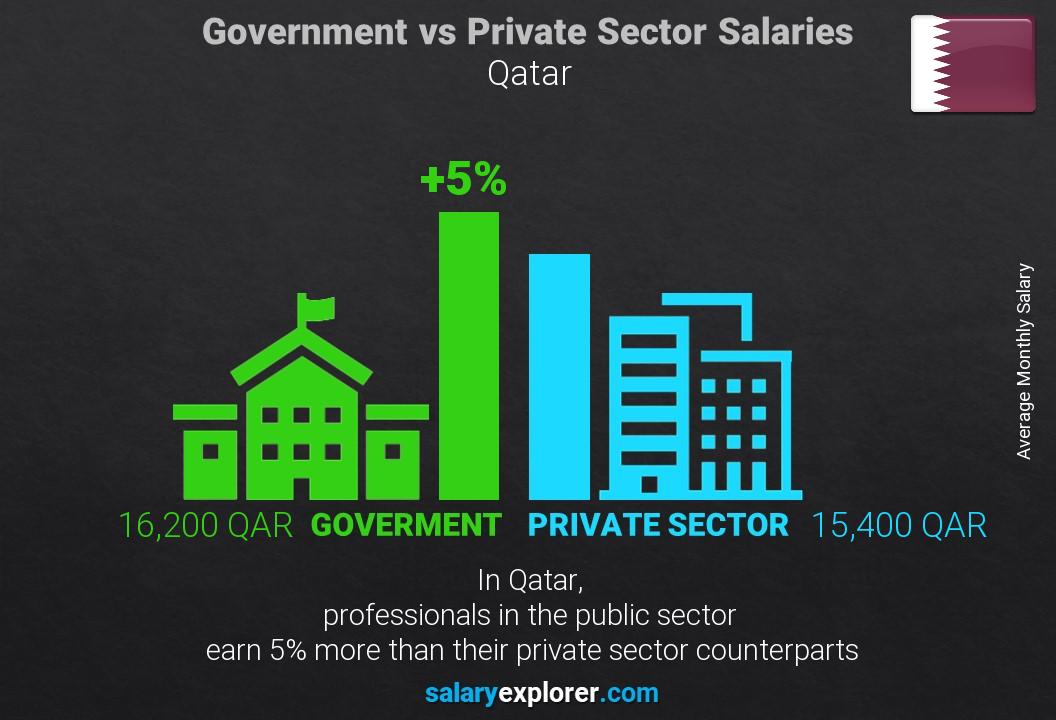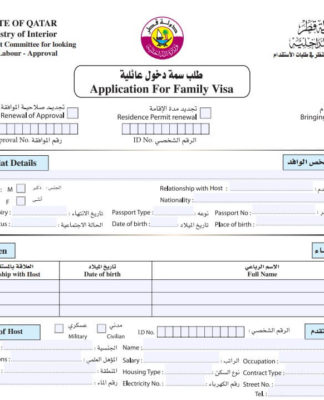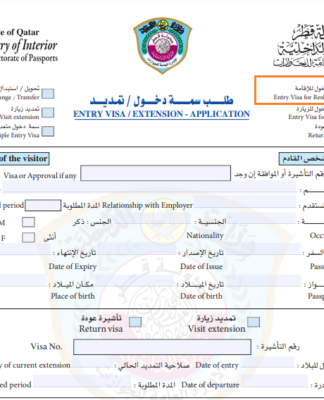Average Salary in Qatar 2020
How much money does a person working in Qatar make?

LOW
2,140
QAR AVERAGE
15,800
QAR HIGH
70,000
QAR
A person working in Qatar typically earns around 15,800 QAR per month. Salaries range from 2,140 QAR (lowest average) to 70,000 QAR (highest average, actual maximum salary is higher).
This is the average monthly salary including housing, transport, and other benefits. Salaries vary drastically between different careers. If you are interested in the salary of a particular job, see below for salaries for specific job titles.
Distribution of Salaries in Qatar
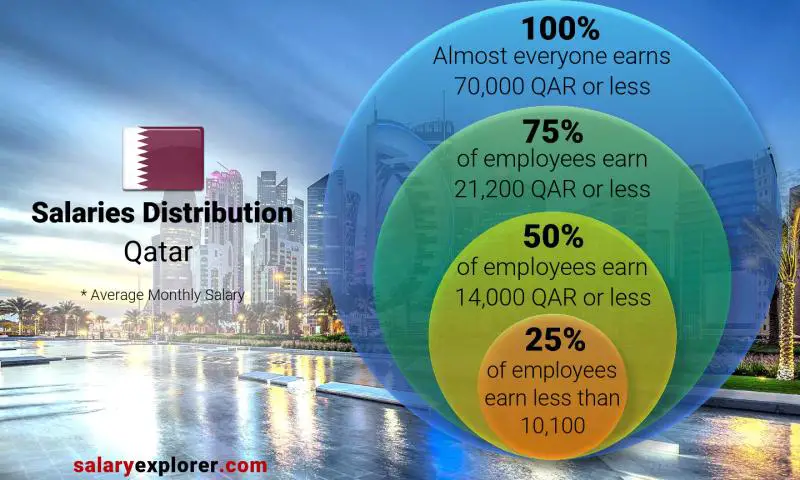
The median, the maximum, the minimum, and the range
-
Salary Range
Salaries in Qatar range from 2,140 QAR per month (minimum salary) to 70,000 QAR per month (maximum average salary, actual maximum is higher).
-
Median Salary
The median salary is 15,800 QAR per month, which means that half (50%) of the population are earning less than 15,800 QAR while the other half are earning more than 15,800 QAR. The median represents the middle salary value. Generally speaking, you would want to be on the right side of the graph with the group earning more than the median salary.
-
Percentiles
Closely related to the median are two values: the 25th and the 75th percentiles. Reading from the salary distribution diagram, 25% of the population are earning less than 8,080 QAR while 75% of them are earning more than 8,080 QAR. Also from the diagram, 75% of the population are earning less than 42,900 QAR while 25% are earning more than 42,900 QAR.
What is the difference between the median and the average salary?
Both are indicators. If your salary is higher than both of the average and the median then you are doing very well. If your salary is lower than both, then many people are earning more than you and there is plenty of room for improvement. If your wage is between the average and the median, then things can be a bit complicated. We wrote a guide to explain all about the different scenarios. How to compare your salary
Salary Comparison by Years of Experience
How does a person’s salary progress over time?
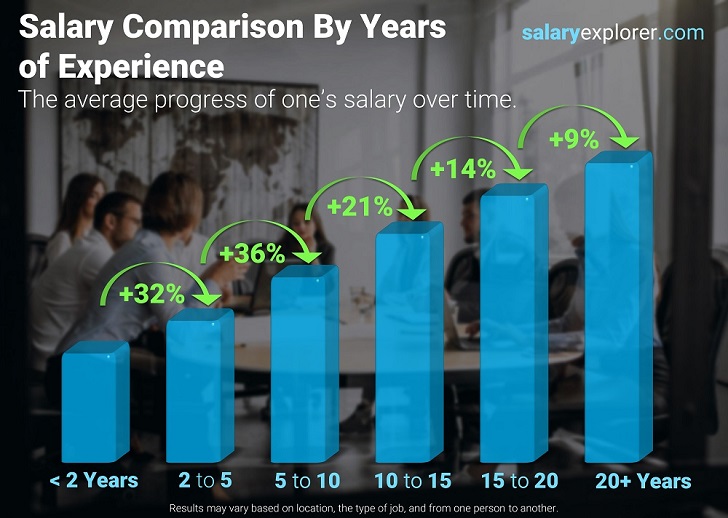
The experience level is the most important factor in determining the salary. Naturally the more years of experience the higher the wage.
Generally speaking, employees having experience from two to five years earn on average 32% more than freshers and juniors across all industries and disciplines.
Professionals with experience of more than five years tend to earn on average 36% more than those with five years or less of work experience.
As you hit the ten years mark, the salary increases by 21% and an additional 14% for those who have crossed the 15 years mark.
Those figures are presented as guidelines only. The numbers become more significant if you consider one job title at a time.
Salary Comparison By Education
How does the education level affect your salary?

It is well known that higher education equals a bigger salary, but how much more money can a degree add to your income? We compared the salaries of professionals at the same level but with different college degrees levels across many jobs, below are our findings.
Workers with a certificate or diploma earn on average 17% more than their peers who only reached the high school level.
Employees who earned a Bachelor’s Degree earn 24% more than those who only managed to attain a cerificate or diploma.
Professionals who attained a Master’s Degree are awarded salaries that are 29% more than those with a Bachelor’s Degree.
Finally, PhD holders earn 23% more than Master’s Degree holders on average while doing the same job.
Is a Master’s degree or an MBA worth it? Should you pursue higher education?
A Master’s degree program or any post-graduate program in Qatar costs anywhere from 79,000 Qatari Rial(s) to 237,000 Qatari Rial(s) and lasts approximately two years. That is quite an investment.
You can’t really expect any salary increases during the study period, assuming you already have a job. In most cases, a salary review is conducted once education is completed and the degree has been attained.
Many people pursue higher education as a tactic to switch into a higher paying job. The numbers seem to support this tactic. The average increase in compensation while changing jobs is approximately 10% more than the customary salary increment.
The decision really depends on your situation and experience among many other factors. Putting all variables aside, if you can afford the costs of higher education then the return on investment is definitely worth it. You should be able to recover the costs in roughly a year or so.
Salary Comparison By Gender
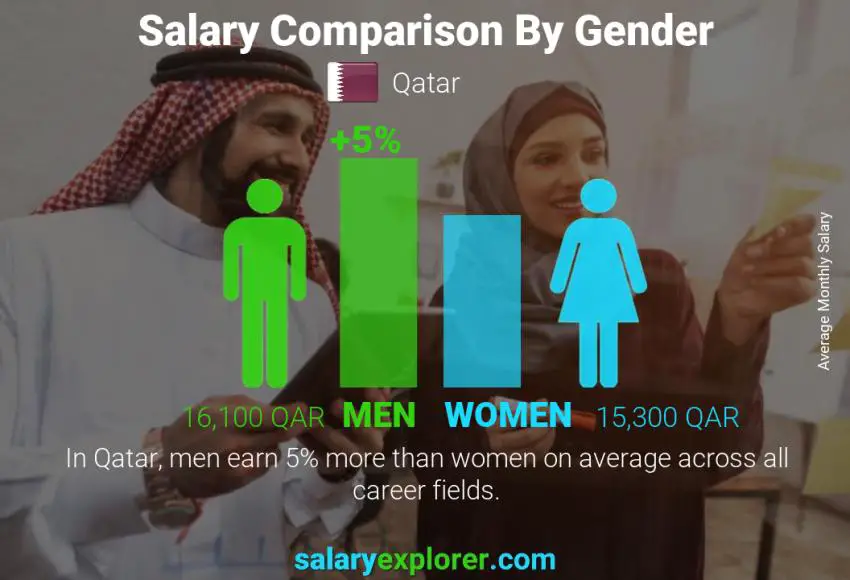
Though gender should not have an effect on pay, in reality, it does. So who gets paid more: men or women? Male employees in Qatar earn 6% more than their female counterparts.
| Female |
15,300 QAR
|
|
| Male | +6% |
16,200 QAR
|
Average Annual Salary Increment Percentage in Qatar
How much are annual salary increments in Qatar? How often do employees get salary raises?
Qatar
Employees in Qatar are likely to observe a salary increase of approximately 9% every 16 months.
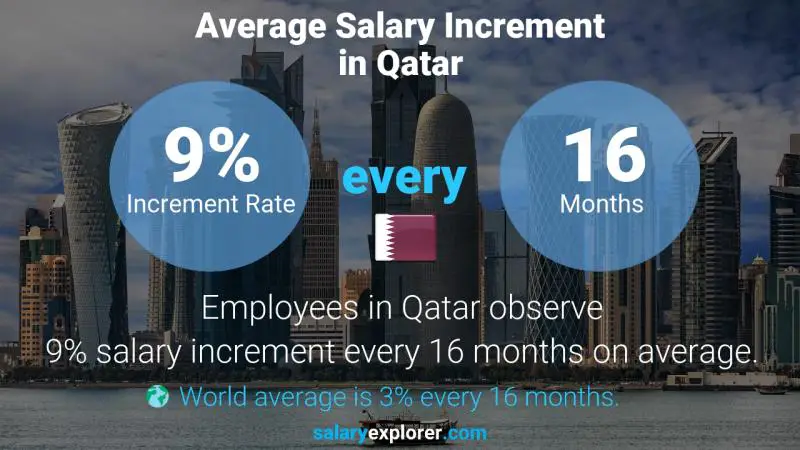
The term ‘Annual Salary Increase’ usually refers to the increase in 12 calendar month period, but because it is rarely that people get their salaries reviewed exactly on the one year mark, it is more meaningful to know the frequency and the rate at the time of the increase.
How to calculate the salary increment percentage?
The annual salary Increase in a calendar year (12 months) can be easily calculated as follows: Annual Salary Increase = Increase Rate x 12 ÷ Increase Frequency
Annual Increment Rate By Industry 2019
| Banking |
5%
|
|
| Energy |
1%
|
|
| Information Technology |
6%
|
|
| Healthcare |
2%
|
|
| Travel |
7%
|
|
| Construction |
3%
|
|
| Education |
8%
|
Listed above are the average annual increase rates for each industry in Qatar for the year 2019. Companies within thriving industries tend to provide higher and more frequent raises. Exceptions do exist, but generally speaking, the situation of any company is closely related to the economic situation in the country or region. These figures tend to change frequently.
Average Salary Increase Rate by Experience Level
| Junoir Level |
3% – 5%
|
|
| Mid-Career |
6% – 9%
|
|
| Senior Level |
10% – 15%
|
|
| Top Management |
15% – 20%
|
The difference in increment rates is somehow justified because employers put more effort to retain more experienced staff since they are harder to acquire than less experienced ones.
Worldwide Salary Raises: All Countries and All Jobs
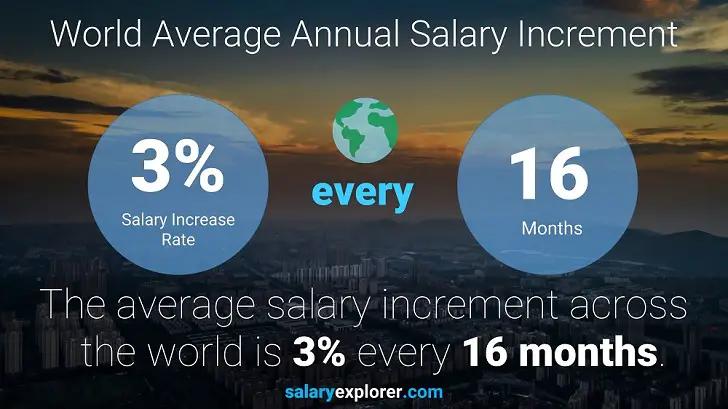
Bonus and Incentive Rates in Qatar
How much and how often are bonuses being awarded?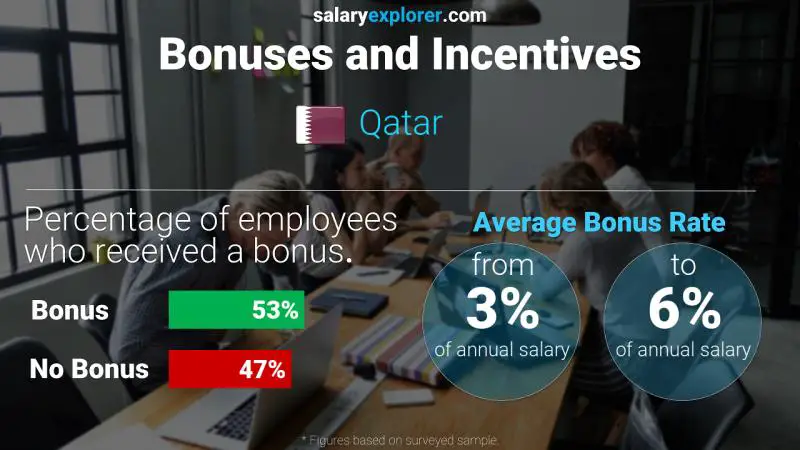
47% of surveyed staff in Qatar reported that they haven’t received any bonuses or incentives in the previous year while 53% said that they received at least one form of monetary bonus.
Those who got bonuses reported rates ranging from 3% to 6% of their annual salary.
| Received Bonus |
53%
|
|
| No Bonus |
47%
|
Types of Bonuses Considered
Individual Performance-Based BonusesThe most standard form of bonus where the employee is awarded based on their exceptional performance.
Company Performance BonusesOccasionally, some companies like to celebrate excess earnings and profits with their staff collectively in the form of bonuses that are granted to everyone. The amount of the bonus will probably be different from person to person depending on their role within the organization.
Goal-Based BonusesGranted upon achieving an important goal or milestone.
Holiday / End of Year BonusesThese types of bonuses are given without a reason and usually resemble an appreciation token.
Bonuses Are Not Commissions!
People tend to confuse bonuses with commissions. A commission is a prefixed rate at which someone gets paid for items sold or deals completed while a bonus is in most cases arbitrary and unplanned.
Bonus Rates Comparison by Career Field
| Finance |
High
|
|
| Architecture |
High
|
|
| Sales |
High
|
|
| Business Development |
High
|
|
| Marketing / Advertising |
High
|
|
| Information Technology |
Moderate
|
|
| Healthcare |
Moderate
|
|
| Insurance |
Moderate
|
|
| Customer Service |
Moderate
|
|
| Human Resources |
Moderate
|
|
| Construction |
Low
|
|
| Transport |
Low
|
|
| Hospitality |
Low
|
What makes a position worthy of good bonuses and a high salary?
The main two types of jobs |
|
| Revenue Generators | Supporting Cast |
| Employees that are directly involved in generating revenue or profit for the organization. Their field of expertise usually matches the type of business. | Employees that support and facilitate the work of revenue generators. Their expertise is usually different from that of the core business operations. |
| Example: A graphics designer working for a graphics designing company. |
Example: A graphic designer in the marketing department of a hospital. |
Revenue generators usually get more and higher bonuses, higher salaries, and more frequent salary increments. The reason is quite simple: it is easier to quantify your value to the company in monetary terms when you participate in revenue generation.
Bonus Comparison by Seniority Level
Top management personnel and senior employees naturally exhibit higher bonus rates and frequencies than juniors. This is very predictable due to the inherent responsibilities of being higher in the hierarchy. People in top positions can easily get double or triple bonus rates than employees down the pyramid.
Government vs Private Sector Salary Comparison

Where can you get paid more, working for a private company or for the government? Public sector employees in Qatar earn 5% more than their private sector counterparts.
| Private Sector |
15,400 QAR
|
|
| Public Sector | +5% |
16,200 QAR
|
Salaries for specific job categories
Choose a job category to explore specific salary details
Accounting and FinanceAdministration / Reception / SecretarialAdvertising / Grapic Design / EventsAirlines / Aviation / Aerospace / DefenseArchitectureAutomotiveBankingBilingualBusiness PlanningCare Giving and Child CareCleaning and HousekeepingConstruction / Building / InstallationCounselingCourier / Delivery / Transport / DriversCustomer Service and Call CenterElectrical and Electronics TradesEngineeringEnvironmentalExecutive and ManagementFacilities / Maintenance / RepairFactory and ManufacturingFashion and ApparelFitness / Hair / BeautyFood / Hospitality / Tourism / CateringFundraising and Non ProfitGardening / Farming / FishingGovernment and DefenceHealth and MedicalHuman ResourcesImport and ExportIndependent JobsInformation TechnologyInsuranceLaw Enforcement / Security / FireLegalMarketingMedia / Broadcasting / Arts / EntertainmentOil / Gas / Energy / MiningPet CarePharmaceutical and BiotechnologyPhotographyPublic RelationsPublishing and PrintingPurchasing and InventoryQuality Control and ComplianceReal EstateRecreation and SportsSales Retail and WholesaleScience and Technical ServicesTeaching / EducationTelecommunication
Salary Trend and Forecast in Qatar
How are Qatar salaries changing over time? The chart below shows the average salary change in the past few years.
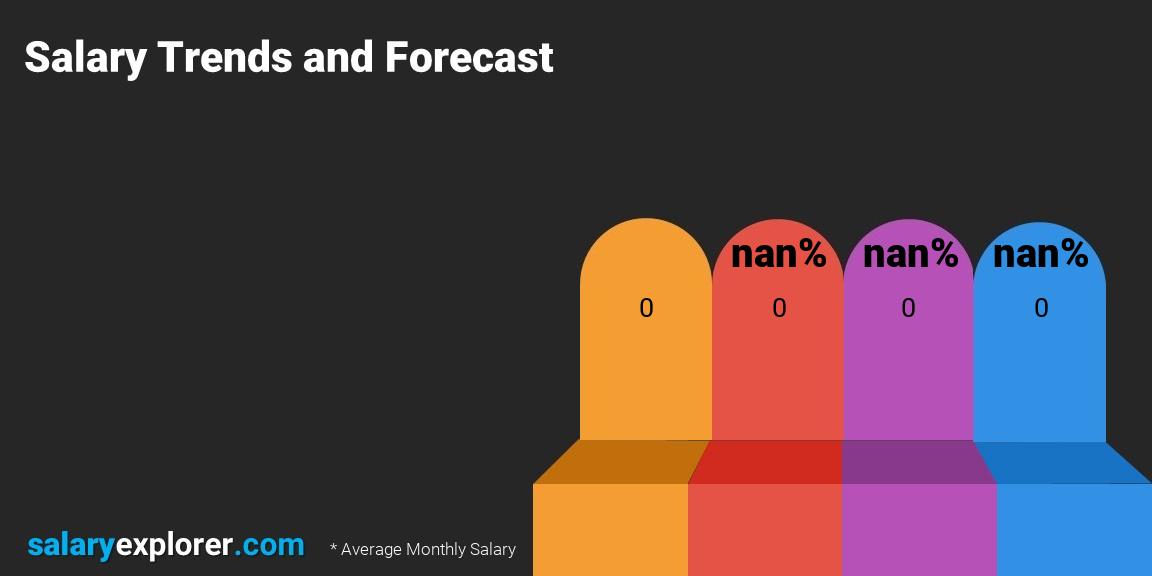
| Average Salary 2016 |
14,300 QAR
|
|
| Average Salary 2017 | +4% |
14,800 QAR
|
| Average Salary 2018 | +2% |
15,200 QAR
|
| Average Salary 2019 | +1% |
15,400 QAR
|
Salaries in Qatar are on the rise in the year 2020 based on recent submitted salaries and reports. As displayed in the chart, salaries in 2019 are 1% higher than those of 2018. The trend suggests a slow yet continuous increase in pay in 2021 and future years. These numbers may vary from industry to another.
Salaries for popular jobs
| Job Title | Average Salary |
| Accounting and Finance | |
| Accountant | 10,200 QAR |
| Accounting Assistant | 9,600 QAR |
| Accounting Manager | 20,400 QAR |
| Bookkeeper | 8,100 QAR |
| Chartered Accountant | 12,700 QAR |
| Corporate Treasurer | 25,300 QAR |
| Financial Analyst | 16,300 QAR |
| Financial Manager | 29,800 QAR |
| Internal Auditor | 15,000 QAR |
| Administration / Reception / Secretarial | |
| Administrative Assistant | 8,260 QAR |
| Office Manager | 10,700 QAR |
| Receptionist | 7,950 QAR |
| Secretary | 8,390 QAR |
| Advertising / Grapic Design / Events | |
| Art Director | 15,400 QAR |
| Creative Director | 14,900 QAR |
| Graphic Designer | 9,940 QAR |
| Photographer | 10,300 QAR |
| Airlines / Aviation / Aerospace / Defense | |
| Aerospace Engineer | 15,900 QAR |
| Air Traffic Controller | 15,900 QAR |
| Flight Attendant | 12,400 QAR |
| Pilot | 18,500 QAR |
| Architecture | |
| Architect | 13,500 QAR |
| CAD Drafter | 11,300 QAR |
| Automotive | |
| Mechanic | 8,230 QAR |
| Service Advisor | 11,800 QAR |
| Banking | |
| Bank Branch Manager | 22,500 QAR |
| Teller | 10,500 QAR |
| Bilingual | |
| Teacher | 11,500 QAR |
| Translator | 12,700 QAR |
| Business Planning | |
| Business Analyst | 18,100 QAR |
| Business Development Manager | 22,100 QAR |
| Project Manager | 17,800 QAR |
| Care Giving and Child Care | |
| Nanny | 9,180 QAR |
| Nursery Teacher | 10,800 QAR |
| Construction / Building / Installation | |
| Civil Engineer | 14,200 QAR |
| Construction Project Manager | 18,100 QAR |
| Health and Safety Officer | 9,570 QAR |
| Customer Service and Call Center | |
| Call Center Representative | 10,000 QAR |
| Customer Service Manager | 20,800 QAR |
| Customer Service Representative | 10,800 QAR |
| Engineering | |
| Civil Engineer | 13,700 QAR |
| Electrical Engineer | 15,300 QAR |
| Engineer | 13,500 QAR |
| Mechanical Engineer | 15,200 QAR |
| Executive and Management | |
| Chief Executive Officer | 35,300 QAR |
| Chief Financial Officer | 31,500 QAR |
| General Manager | 27,700 QAR |
| Project Manager | 17,500 QAR |
| Food / Hospitality / Tourism / Catering | |
| Chef | 12,200 QAR |
| Executive Chef | 13,800 QAR |
| Hotel Manager | 23,000 QAR |
| Receptionist | 11,000 QAR |
| Travel Agent | 11,900 QAR |
| Waiter / Waitress | 9,480 QAR |
| Health and Medical | |
| Dentist | 35,100 QAR |
| Dietitian | 34,700 QAR |
| Laboratory Technician | 11,700 QAR |
| Nurse | 11,800 QAR |
| Human Resources | |
| Human Resources Manager | 21,400 QAR |
| Human Resources Officer | 12,700 QAR |
| Information Technology | |
| Computer Technician | 11,300 QAR |
| Database Administrator | 15,500 QAR |
| Developer / Programmer | 12,700 QAR |
| Information Technology Manager | 20,900 QAR |
| Network Engineer | 12,700 QAR |
| Law Enforcement / Security / Fire | |
| Police Officer | 11,400 QAR |
| Legal | |
| Attorney | 22,600 QAR |
| Legal Assistant | 11,000 QAR |
| Media / Broadcasting / Arts / Entertainment | |
| Journalist | 14,400 QAR |
| Pharmaceutical and Biotechnology | |
| Biomedical Engineer | 12,700 QAR |
| Pharmacist | 17,400 QAR |
| Sales Retail and Wholesale | |
| Cashier | 8,480 QAR |
| Sales Manager | 23,100 QAR |
| Sales Representative | 9,360 QAR |
| Teaching / Education | |
| Elementary School Teacher | 10,000 QAR |
| Secondary School Teacher | 12,500 QAR |
Average Hourly Wage in Qatar
 91 QAR per hour
91 QAR per hourThe average hourly wage (pay per hour) in Qatar is 91 QAR. This means that the average person in Qatar earns approximately 91 QAR for every worked hour.
The hourly wage is the salary paid in one worked hour. Usually jobs are classified into two categories: salaried jobs and hourly jobs. Salaried jobs pay a fix amount regardless of the hours worked. Hourly jobs pay per worked hour. To convert salary into hourly wage the above formula is used (assuming 5 working days in a week and 8 working hours per day which is the standard for most jobs). The hourly wage calculation may differ slightly depending on the worked hours per week and the annual vacation allowance. The figures mentioned above are good approximations and are considered to be the standard. One major difference between salaried employees and hourly paid employees is overtime eligibility. Salaried employees are usually exempt from overtime as opposed to hourly paid staff.










